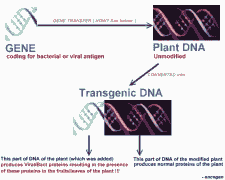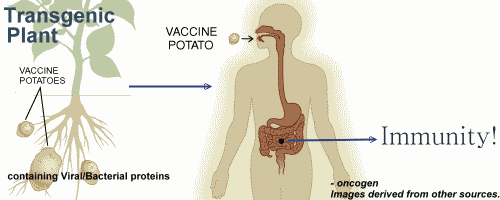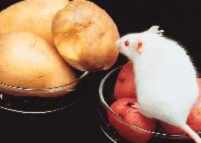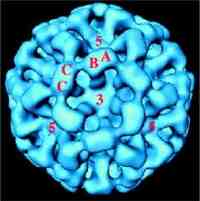
Although
the title given to this article is a bit frivolous, the research in this field
certainly is not.
This type of vaccine delivery aims to deliver vaccines into the body via the GI
tract, the major problem of course being the degradation of antigens by HCl in
the stomach.
A bit of history first...
 The concept of edible vaccines is
nowhere as recent as you would expect it to be. The idea was first put forth by
Dr. Charles Arntzen (then a Professor at University of Texas A&M) 10 years
ago as an inexpensive and painless way to deliver vaccines which would be
especially useful in developing countries like India. Prototype vaccines were
developed even at that early stage, however with relatively poor understanding
of the bacterial/viral genomes back then, the success rate was limited.
The concept of edible vaccines is
nowhere as recent as you would expect it to be. The idea was first put forth by
Dr. Charles Arntzen (then a Professor at University of Texas A&M) 10 years
ago as an inexpensive and painless way to deliver vaccines which would be
especially useful in developing countries like India. Prototype vaccines were
developed even at that early stage, however with relatively poor understanding
of the bacterial/viral genomes back then, the success rate was limited.
Image
: The Lord and Master of Edible
vaccine research, Dr. Charles Arntzen.
Around 1995-1996, tests using edible vaccines in mice began to become impressively
successful. The mice, which were fed potatoes which contained antigens, showed a
good systemic and mucosal response (more about mucosal immunity
later...) to these antigens. The first diseases that the mice were immunized
against included cholera, ETEC and hepatitis B.
Human trials were first
conducted at around 1996-1997. Only a few trials have been conducted to date ,
and an edible vaccine is a long way off. But judging from the results of the
trials, the "edible vaccine" or "Biotech Bannana" is
anything but impossible...
Had enough of TP?? ok...:) sorry... lets see how
you can:
Make your own Biotech
banana :
In short the process is this :
You
mess around with the genetic code of the plant (more on how to do this later..)
and introduce a gene which codes for a particular protein antigen
(bacterial/viral) into its genome. (Producing what is called a
transgenic organism, or an organism which contains genes belonging to one or
more organisms e.g. transgenic pigs which have human organs)

Image:
production of transgenic DNA. Please click on the image to have a look at the
larger picture before you read further.... :)
Now as this genetically modified plant grows, it synthesizes the protein
antigen along with the normal plant proteins.
When someone eats this plant or its fruit, along with the other plant
proteins, he also ingests the antigen. This antigen then induces an immune
response in the person who swallowed the fruit.

Simple
isn't it... well actually not quite... Introducing the bacterial/viral gene can
be a messy process. Since the discussion about that subject is a bit technical,
I have placed it at the very end of this article.
Current
research on the subject:
Whoa!
Now that all the technical stuff is behind us, we can take a look at what
exactly this new approach to vaccination has achieved so far...
1)
Animal Trials :
 Animal trials (usually with
mice) , as I have already mentioned, have been going on for a long, long time.
Mice have been immunized against Rabies, Hepatitis B, ETEC, cholera ,
Helicobacter Pylori with varying (but gradually increasing) success.
Animal trials (usually with
mice) , as I have already mentioned, have been going on for a long, long time.
Mice have been immunized against Rabies, Hepatitis B, ETEC, cholera ,
Helicobacter Pylori with varying (but gradually increasing) success.
Image
: A mouse contemplating some nice
looking potatoes while sitting over some tomatoes...lol..just kidding...had to
write something....
2)
Human Trials :
The first ever trial of an edible vaccine was in 1998 at the University
of Maryland, USA.The goal of the study was to demonstrate that an
edible vaccine could stimulate an immune response in humans. Volunteers ate
bite-sized pieces of raw potato that had been genetically engineered to produce
part of the toxin secreted by the Escherichia coli bacterium.
Ten of the 11 volunteers (91 percent) who ingested the transgenic potatoes had
fourfold rises in serum antibodies.
 A
recent study conducted by Arntzen involved
the Norwalk Virus (which causes diarrhea). In this study, 19 out of 20 persons
showed increases in the serum antibody levels.
A
recent study conducted by Arntzen involved
the Norwalk Virus (which causes diarrhea). In this study, 19 out of 20 persons
showed increases in the serum antibody levels.
Image : Computer reconstruction of
the Norwalk virus.
Similarly,
after Hilary Krapowski of Thomas Jefferson University
fed transgenic lettuce carrying a hepatitis B antigen to three volunteers, two
of the subjects displayed a good systemic response.
Scientists
are even toying around with the idea of introducing some HIV genes into plants
thus developing an edible HIV vaccine!]
Advantages/Disadvantages of the biotech
banana/ other edible vaccines :
Advantages:
 1)
Although the technology at first seems like something done for convenience
rather than being something of significant utility, the fact is that
poorly developed nations like India
which have a relatively poor vaccination program are most likely to benefit from
such a vaccine.
1)
Although the technology at first seems like something done for convenience
rather than being something of significant utility, the fact is that
poorly developed nations like India
which have a relatively poor vaccination program are most likely to benefit from
such a vaccine.
This is also the reason why many of the projects mentioned here (including
Arntzen's early work) have been funded by the WHO.
Image
: No caption required I think...
2)
Mucosal immunity : The vaccines which are given parenterally
(e.g. Intramuscularly) induce a systemic response but little or no local immune
response in the GI tract. This so called "mucosal immunity " is
increasingly being considered very important for defense against GI pathogens. (
Remember OPV..)
3)
And of course, it's painless and convenient
Disadvantages:
1) The vaccine
dose would be inadequate if the patient eats only one banana/potato
instead of the recommended two. Furthermore, there might be difficulties in
judging the dose itself since the amount of antigen in each fruit cannot be
accurately measured.
2) The risk of
introducing a new gene into the Plant DNA population is not known.
The gene may jump species and propagate into other plants (or wild varieties of
the same plants).
This may cause unpredictable results including a decrease in the number or even
extinction of a particular plant species due to growth stunting caused by the
viral/bacterial gene. (This has been known to occur in research studies,
including Arntzen's)
3)"Oral
Tolerance": In another concern, scientists need to be
sure that vaccines meant to enhance immune responses do not backfire and
suppress immunity instead. Research into a phenomenon called oral tolerance has
shown that ingesting certain proteins can at times cause the body to shut down
its responses to those proteins.
This may cause the body to become more susceptible to a particular disease agent
rather than become immunized against it.
According
to Dr. Cummins of the "Organics Consumer union" (US) :
"Scientists who are not beholden to the biotech industry would agree that
edible vaccines are too dangerous to pursue"
And furthermore : "The whole idea is crazy."
-
Oncogen
Comments? Corrections? Additions? Please
email oncogen@kemates.com





Additional Notes :
Ahh..
lets get down to some nitty gritty shall we?
Why
bananas?
The major problem with edible vaccines is the possible degradation of the
antigen (in other words denaturation of the antigenic protein). The problem of
degradation by gastric HCl has been solved somewhat by increasing the amount of
antigen that is ingested.
However, denaturation of the antigen can also occur during the cooking process.
As a result of this the edible vaccines would have to be eaten raw. (imagine
eating raw potatoes...)
Most of the research has so far concentrated on potatoes (since they are easier
to grow) but a lot of research has also been put in adapting the technology to
more palatable alternatives like bananas, tomatoes and lettuce.
Unexpected
benefits:
Remember the "oral
tolerance" thing I mentioned earlier? Well it can be put to
constructive use in autoimmunity:
In the past 15 years, investigators have identified several beta cell proteins
that can elicit autoimmunity in people predisposed to type I diabetes. The main
culprits, however, are insulin and a protein called GAD (glutamic acid
decarboxylase). Scientists have developed plant-based diabetes vaccines, such as
potatoes containing insulin or GAD. Feeding of the vaccines to a mouse strain
that becomes diabetic helped to suppress the immune attack and to prevent or
delay the onset of high blood sugar.
HEY!
You still haven't mentioned how you can get the viral/Bacterial gene inside the
plant DNA!!!
Still interested? Click on the link
below for an explanation (I'll let you in on a secret..
this is THE most interesting part of the article):
How
to get a viral/Bacterial gene inside Plant DNA
![]()